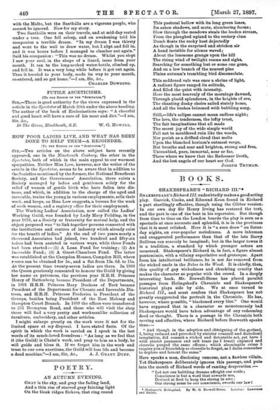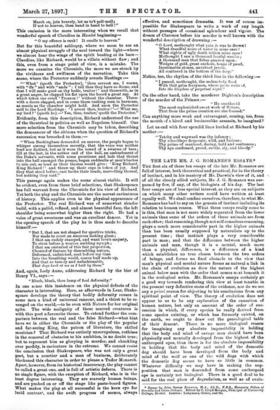BOOKS.
SHAKESPEARE'S "RICHARD III."* SHAKESPEARE'S Richard III. undoubtedly makes a good acting play. Garrick, Cooke, and Edmund Kean found in Richard a part startlingly effective, though using the Cibber version. In our own day Sir Henry Irving has restored the text, and the part is one of the best in his repertoire. But though from time to time on the London boards the play is seen as a, spectacle at once accurate and splendid, it is in the provinces that it is most relished. Here it is "a sure draw" on Satur- day nights, an ever-popular melodrama. A more inhuman. and exaggerated performance than that of the late Barry.
Sullivan can scarcely be imagined; but in the larger towns it is a tradition, a standard by which younger actors are measured. Shakespeare's Richard is, in fact, a figure almost pantomimic, with a villainy superlative and grotesque. Apart from his intellectual brilliance, he is not far removed from the wicked uncle in the Babes in the Wood. It is chiefly, then, this quality of gay wickedness and chuckling cruelty that makes the character so popular with the crowd. In a deeply interesting book, Mr. Boswell-Stone has placed parallel passages from Holingshed's Chronicle and Shakespeare's historical plays side by side. We at once turned to Richard III., and must confess that Shakespeare has not greatly exaggerated the portrait in the Chronicle. He has, however, where possible, "blackened every blot." One would have supposed that in a character so monotonously bad Shakespeare would have taken advantage of any redeeming deed or thought. There is a passage in the Chronicle both moving and effective, where Richard before Bosworth speak& thus:—
" And though in the adeption and obteigning of the garland, I, being seduced and provoked by sinister counsell and diabolicall temptation, did commit a wicked and detestable act, yet have I with streict pennance and salt tears (as I trust) expiated and cleerelie purged the same offense ; which abominable crime require you of friendship as cleerelie to forget, as I dailie remember to deplore and lament the same."
Here speaks a man, disclosing remorse, not a flawless villain. Yet Shakespeare deliberately ignores this passage, and pats into the month of Richard words of ranting desperation :—
"Let not our babbling dreams affright our souls ; Conscience is but a word that cowards use. Devised at first to keep the strong in awe ; Our strong arms be our conscience, swords our law I
• Shakaperea Holingehad. By W. G. Bo3well-Stone. London: La.wrenos and Sullen.
March on, join bravely, let us to't pell-mell;
If not to heaven, then hand in hand to hell !"
This omission is the more interesting when we recall that wonderful speech of Claudius in Hamlet beginning- " 0 my offence is rank! It smells to heaven."
But for this beautiful soliloquy, where we seem to see an almost physical struggle of the soul toward the light—where we almost hear the wings of the spirit beating at its bars—
Claudius, like Richard, would be a villain without flaw ; and this, even from a stage point of view, is a mistake. The more we examine the Chronicle, the more we are struck by the vividness and swiftness of the narration. Take this scene, where the Protector suddenly arrests Hastings :—
"‘ What ' (quoth the Protector), 'thou servest me, I weene, with "ifs" and with "ands " : I tell thee they have so doone, and that I will make good on thy bodie, traitor !' and therewith, as in a great anger, he clapped his fist upon the boord a great rap. At which token one cried 'Treason!' without the chamber. There- with a doore clapped, and in come there rushing men in harnesse, as manie as the chamber might hold. And anon the Protector
said to the Lord Hastings : I arrest thee, traitor What me. my lord ? ' (quoth he).—' Yea, thee, traitor,' quoth the Protector."
Evidently, from this description, Richard understood the use of the theatrical in politics as well as Napoleon himself. One
more selection from the Chronicle may be taken, describing the demeanour of the citizens when the question of Richard's succession was broached to them :—
"When Buckingham demanded an answer, the people began to whisper among themselves secretly, that the voice was neither loud nor distinct, but as it were the sound of a swarme of bees; till at the last, in the nether end of the hall, an ambnshment of the Duke's servants, with some prentisses and lads that thrust into the hall amongst the prease, began suddenfie at men's baekes to crie out, as loud as their throtes would give : King Richard, King Richard !' and threw up their caps in token of joy. And they that stood before, cast backe their heads, marvelling thereof, but nothing they said."
This passage again makes the scene almost visible. It will be evident, even from these brief selections, that Shakespeare has full warrant from the Chronicle for his view of Richard. Yet both the play and the Chronicle are the merest caricatures of history. This applies even to the physical appearance of the Protector. The real Richard was of somewhat slender build, with a pallid, refined, and almost beautiful face, the left shoulder being somewhat higher than the right. He had a voice of great sweetness and was an excellent dancer. Yet in the opening speech of the play he is thus made to describe himself :—
" But I, that am not shaped for sportive tricks, Nor made to court an amorous looking glass ; I that am rudely stamped, and want love's majesty, To strut before a wanton ambling nymph ; I that am curtailed of this fair proportion, Cheated of feature by dissembling nature, Deformed, unfinished, sent before my time Into the breathing world, scarce half made up, And that so tamely and unfashionable, That dogs bark at me as I halt by them."
And, again, Lady Anne, addressing Richard by the bier of Henry VI., says :—
"Blush, blush, thou lump of foul deformity."
In one sense this insistence on the physical defects of the character is interesting. Here, as afterwards in Lear, Shake- speare develops the theory that bodily deformity rouses in some men a kind of universal rancour, and a thirst to be re- venged on the world,—to be even with Nature for her original spite. The wide malignity of these marred creatures is with this poet a favourite theme. To extend further the com- parison between the real and the false Richard—what hint have we in either the Chronicle or the play of the popular and far-seeing King, the patron of literature, the skilled musician ? That Richard was entirely unscrupulous, ruthless in the removal of obstacles to his ambition, is no doubt true ; but to represent him as glorying in murder, and chuckling over perfidy, is caricature in the extreme. We cannot resist the conclusion that Shakespeare, who was not only a great poet, but a courtier and a man of business, deliberately blackened this character in order to please a Tudor Monarch. Apart, however, from its historical inaccuracy, the play cannot be called a great one, and is fall of artistic defects. There is no single figure, with the exception of Richard, who is in the least degree interesting. They are scarcely human beings, and are pushed on or off the stage like paste-board figures.
What makes the play at all successful is the keen eye for lurid contras*, and the swift progress of scenes, always
effective, and sometimes dramatis. It was of course im- possible for Shakespeare to write a work of any length without passages of occasional splendour and vigour. The dream of Clarence before his murder is well known with the wonderful description of drowning :— "0 Lord, methonght what pain it was to drown! What dreadful noise of water in mine ears ! What sights of ugly death within mine eyes ! Methought I saw a thousand fearful wrecics ; A thousand men that fishes gnawed upon : Wedges of gold, great anchors, heaps of pearl, Inestimable atones, unvalued jewels, All scattered in the bottom of the deep."
Notice, too, the rhythm of the third line in the following
"I passed, methought, the melancholy flood With that grim ferryman, whom poets write of, Into the kingdom of perpetual night."
On the other hand, take the murderer Dighton's description of the murder of the Princes :—
'Ho smothei61
The most replenished sweet work of Nature, That from the prime creation ere she framed."
Can anything more weak and extravagant, coming, too, from the mouth of a hired and businesslike assassin, be imagined ?
Let us end with four spendid lines hurled at Richard by his mother :—
" Tetchy and wayward was thy infancy ;
Thy schooldays desperate, wild, and furious ; Thy prime of manhood, daring, bold and venturous ; Thy age confirmed, proud, subtle, sly, and bloody."







































 Previous page
Previous page